&
BECOME A MEMBER &
HELP CREATE A PARALLEL ACADEMIA
Login / Public Programs / About / People / Membership / Programs / Seminars / Archive / Connect / Refund Policy / Apply Now / e-flux Education
For currently running and past Seminars please visit the Archive.Critical Collapsology Part 2:
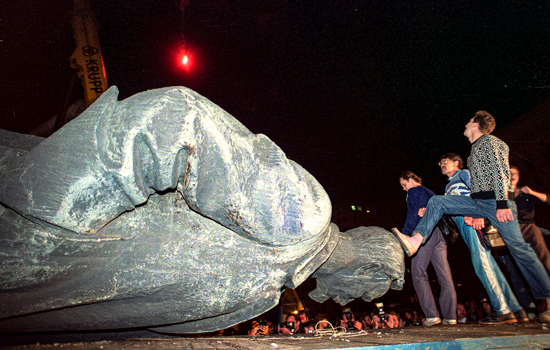 DESCRIPTION: Last season, in the first part of this Seminar, we established a new frame for studying the rapid decomposition of social structure, called 'critical collapsology.' This theory more adequately conceptualizes the vulnerabilities faced by global capitalist societies and sketches an orientation toward collapse.
DESCRIPTION: Last season, in the first part of this Seminar, we established a new frame for studying the rapid decomposition of social structure, called 'critical collapsology.' This theory more adequately conceptualizes the vulnerabilities faced by global capitalist societies and sketches an orientation toward collapse.
However, the theory remains relatively abstract. In this second part of the Seminar, we will look at the particular histories that have led us to our vulnerable present moment and develop a radical politics adequate to our incapacity for formulating utopias. How did the world become so vulnerable? How have people responded to vulnerability before? Why is the end of utopia a problem for the left? What institutions should we create now, and how?
Session 1: We will run a collective mapping project to enumerate our current risks. We will introduce the horizon scanning techniques, the Delphi method, and the basic principles and theory of prediction markets.
Session 2: Starting from the premise that collapse is already an object in contemporary politics, we will survey responses to its prospect. Each response imagines a particular mode of collapse and proposes ways to address it. These responses range from drastic to gentle, gestural to programmatic.
Session 3: We turn to the reformulation of a 'communist core' in politics and its status, given the risk of collapse. The communist task requires actualization in a world simultaneously made possible and frustrated by capitalism. Marx and Engels describe communism as ""the real movement which abolishes the present state of things. The conditions of this movement result from the premises now in existence."" What if those premises are no longer in existence?
Session 4: Exploring practical questions, we ask what political possibilities persist through any future collapse, materially and conceptually. What strategies for resilience, emergency responses, and transformations of thought into transportable protocols might be required during different stages of collapse? What should we build now?
"
IMAGE: Gabriel Alcala, Foucault In California, 2023
To see The New Centre Refund Policy CLICK HERE.
Avant-Garde Today:
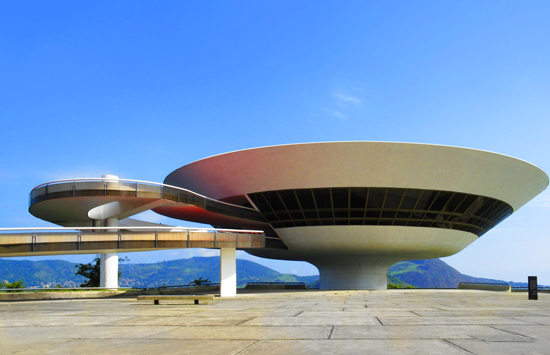 DESCRIPTION: This Seminar brings together two understandings of the problem of the avant-garde in art: the now classic approach offered by Peter Bürger in his seminal book “Theory of the Avant-Garde” (1974) and Harry Lehmann’s essay “Avant-Garde Today” (2008). The Seminar hypothesizes that these two understandings illustrate different models of progress in and against art’s autonomy that will be worked with through the four sessions. In doing so, it hopes to question the many connections that bring together art, the hypothesis of its autonomy, and its political affordances.
DESCRIPTION: This Seminar brings together two understandings of the problem of the avant-garde in art: the now classic approach offered by Peter Bürger in his seminal book “Theory of the Avant-Garde” (1974) and Harry Lehmann’s essay “Avant-Garde Today” (2008). The Seminar hypothesizes that these two understandings illustrate different models of progress in and against art’s autonomy that will be worked with through the four sessions. In doing so, it hopes to question the many connections that bring together art, the hypothesis of its autonomy, and its political affordances.
Bürger understands the avant-gardist impulse not as a new style within the institution of art but as an attempt to break with art altogether, scattering aesthetic effects upon life at large. He offers one of the clearest understandings of the avant-garde, based on art reaching out of its own definition—progressively absorbing that which is not art into that which is art. While the historical avant-garde is seen by Bürger as a final breaking point, given that art is individualized as an autonomous sphere, this same notion is taken by Lehmann to offer a model of aesthetic modernity predicated on the autonomization of the elements that compose art. Instead of reading the avant-garde as an impulse to the outside, Lehmann sees it as a new coupling between the work, the medium, and reflection itself.
Complementing these two models of the avant-garde, this Seminar will also tackle the theoretical basis the two authors are polemicizing against: Adorno's “Aesthetic Theory,” a model that Bürger takes to be intrinsically anti-avant-gardist and Lehmann tries to supersede with his understanding. Finally, in the last session we will see a more recent synthetic approach by Mattin on his book “Social Dissonance” (2023). Mattin offers a contemporary model for art reaching out of its limits—towards politics—but coinciding with a change in the materials of artmaking. Now, instead of aesthetic appearance, as Adorno would have it, the social world appears to constraint art.
Session 1: We will delve into the general themes of the Seminar, through a reading of selected sections of Bürger’s text and further secondary literature.
Session 2: We will read sections of Adorno’s “Aesthetic Theory” alongside Bürger’s “Adorno’s Anti-Avantgardism” essay. A further comparison will be drawn between Adorno and Benjamin’s “The Work of Art in the Age of Mechanical Reproduction.”
Session 3: Close reading of Harry Lehmann’s essay “Avant-garde Today,” where the model of the avant-gardist integration of the outside is discussed and tentatively replaced by the model of systemic gains in degrees of freedom.
Session 4: Discussing Mattin's very recent “Social Dissonance” (2023) as the latest incarnation of the reaching-out model, but with the twist that, for Mattin, the material of the work of art becomes the social action of its audience.
IMAGE: Oscar Niemeyer, Niteroi Contemporary Art Museum, 1996
To see The New Centre Refund Policy CLICK HERE.
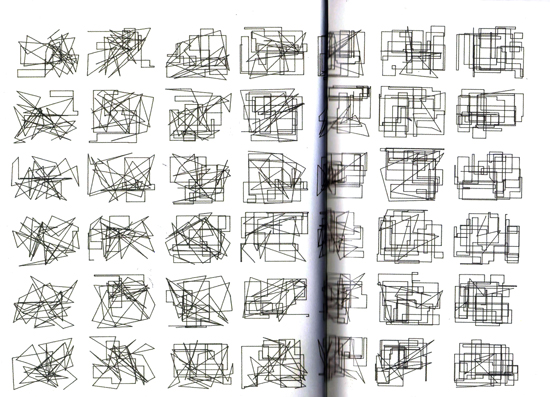 DESCRIPTION: In Jean Cavaillès’s On Logic and the Theory of Science (1942–1943; published posthumously in 1947, hereafter LTS), two central theses emerge:
DESCRIPTION: In Jean Cavaillès’s On Logic and the Theory of Science (1942–1943; published posthumously in 1947, hereafter LTS), two central theses emerge:
These ideas form the foundation of a theory of “logical time,” where mathematics is characterized by its unique historicity—its relationship between earlier and later theories—termed by Cavaillès, based on Descartes’ treatises, as mathematical concatenation. This Seminar explores how this theory, focusing on mathematical history and its philosophical stakes, illuminates the broader tradition of 20th-century French “mathematical philosophy.” Rarely studied in English, this tradition—represented by figures like Léon Brunschvicg, Albert Lautman, and others—emphasizes the history of mathematical production and its shared conceptual terrain with philosophy. Using LTS as a guide and drawing from other sources, the Seminar will construct this broader intellectual history in two parts.
Part I examines Cavaillès’s place within a tradition grappling with the production of the intelligible, rooted in Brunschvicg, Cartesian rationalism, and the paradox of producing time within time itself. Cavaillès reframes this classical problem by asserting that “the intelligible” is defined by internal non-simultaneity and a rejection of total simultaneity in knowledge. His methodological insight—that self-evidence has been replaced by provability—reinterprets intuition as a product of concatenation, or by what Richard Dedekind called a ‘chain of operations,’ aligning with 19th-century mathematical transformations.
Part II Will Consider how these transformations set the stage for a peculiar research programme in the historiography of mathematics. We will take Cavaillès to have (implicitly) advanced a speculative interpretation in which conjunctural results from the mathematical logic of the 1920s and the 1930s concerning the so-called ‘limitations of formalisms’ (Gödel, Skolem, Church-Turing) were taken to be positive discoveries concerning the nature of the intelligible, i.e. its intrinsic ‘movement’ and resistance in principle to combinatorial enumeration. What is at stake here is nothing less than a metaphysics of mathematical production, derived—it is claimed—from an epistemological research programme for reading the actual history of mathematics. In other words, the core methodological desiderata in this tradition of treating each mathematical work as ‘a regional and specific product’ (Desanti 1983), for all that it is often presented as a strictly methodological or epistemological norm, in fact has roots in an underlying metaphysical distinction between production and what is produced (or, in Cavaillès’s language, between the effectuating and the effectuated). As Cavaillès understood it, this meant that contemporary mathematical logic had shown the ruin of any philosophy of transcendental constitution, and thus of post-Kantian approaches to the philosophy of science, including phenomenology.
Against such philosophies of the transcendental subject, Cavaillès (paradoxically) proposed a theory of the act without a subject. We shall close by considering the origins and future of this doctrine in the philosophy of mathematics, broadly conceived.
SEMINAR OUTLINE
Session 1. Introduction to the ‘Production’ of Mathematical Theories and the Transtheoretical Character of Mathematical Objects, Two Perspectives
Session 2. A ‘Cartesian’ Opposition in the Theory of Proof
Session 3. Logical Time as a Problem in the French Philosophical Field
Session 4. The Necessary Generation of New Concepts, or 19th Century Mathematics Through a Cartesian Lens
Session 5. Rationalist Nominalism as a Research Programme in the Historiography of Mathematics
Session 6. The Method of Recursion and the Horizon of Effective Computability
Session 7. The Act Without a Subject
Session 8. Old and New Problems
IMAGE: George Nees, Untitled, 1965
To see The New Centre Refund Policy CLICK HERE.
Art Writing Against the Grain:
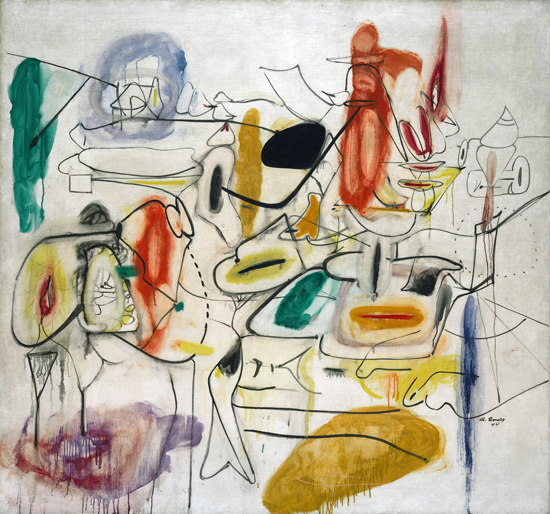 DESCRIPTION: Art criticism has become a hot topic recently, after a long period of repressed dormancy in the art world. Even the forces that formerly sought to smother criticality out of existence now give lip service to the need for criticism. However, this has not coincided with an improved understanding of criticism's means or ends, which sets the stage for an impotent “critical turn.” This Seminar will seek to remedy that blindness by studying the history of contemporary art's move away from criticism alongside examples of criticism's successes and failures.
DESCRIPTION: Art criticism has become a hot topic recently, after a long period of repressed dormancy in the art world. Even the forces that formerly sought to smother criticality out of existence now give lip service to the need for criticism. However, this has not coincided with an improved understanding of criticism's means or ends, which sets the stage for an impotent “critical turn.” This Seminar will seek to remedy that blindness by studying the history of contemporary art's move away from criticism alongside examples of criticism's successes and failures.
Neither the Left's self-satisfied identity politics nor the Right's reactionary provocations present a way back to art as something more than political signification, and we must recover precisely the terms of art's irreducibility if a new criticism is to emerge. To do so, we must understand how those terms changed in the later parts of the twentieth century, how they degenerated into inarticulate relativism, how that relativity expresses itself (even in those who seek to resist it), and how it can be possible to apply new terms of valuation in a hostile climate.
Session 1. The rhetoric of contemporary art: Beginning approximately with the battles around Michael Fried's "Art and Objecthood," come to terms with the expansions of art discourse from the '60s to the trap of 2010s contemporary art as diagnosed by Suhail Malik in "On The Necessity of Art's Exit from Contemporary Art."
Session 2. The indecision of contemporary art criticism: We will look at examples of art writing's inability to engage with contemporary art or set up concepts for adequate discussion while diagnosing the nature of its impasse.
Session 3. The possibility of a new art criticism: We will consider how criticism can reconcile grounded historicity with the awareness of its own relativity, updating judgment without falling into a stale conservatism.
Session 4: Presentation of final projects
IMAGE: Arshile Gorky, Untitled, 1944
To see The New Centre Refund Policy CLICK HERE.
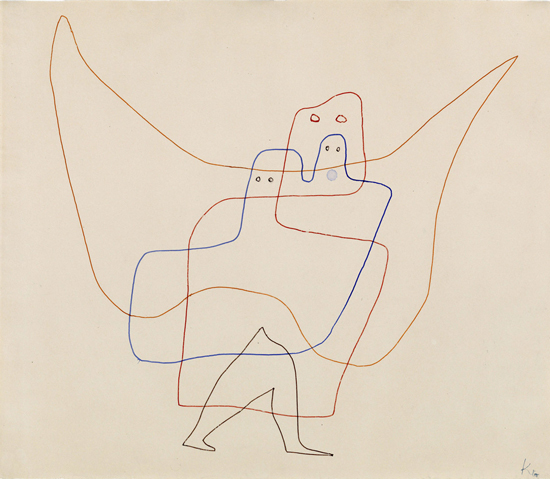 DESCRIPTION: Where are you, right now? Where are you present?
DESCRIPTION: Where are you, right now? Where are you present?
Our bodies, our minds, our ideas, our data: where are they —where are we— present at any given moment? On whose territory —on land, on paper, on servers— are we living our lives and how does that serve us? This Seminar is designed to be as much about those who attend it as the content that is delivered. These gatherings are as much about the physical places from which we join the calls and the physical routes that carry our data between us as they are about the ways in which we co-create places online.
The Seminar is conceived as the establishment of a collaborative lab for collective investigation into presence and co-presence. Our focus will be on a more intentional and considerate relationship with our data, our places, our fellow humans and the other-than-human. While for most of our history, a human individual could be in one place at one time, our ability to extend and expand our presence has grown exponentially in recent centuries. By engaging with the histories and affordances of the social and technical systems that facilitate our meeting from diverse locations around the world, we will explore our relationships and agency —as designers, as worldmakers— within them.
Session 1: Presence & consciousness. We will begin where we are, both in physical and virtual space. We will investigate the relationships between our locations around the world, the locations of our data and the platforms and jurisdictions within which we are resident.
Session 2: Gathering, arrangement & copresence. With a greater consciousness of where we are all reside, we will look at how we gather. For most of human history, gathering and separation has been in physical space. What can we learn from centuries of evolution of gathering places in order to better inform the ways we design and gather in virtual places?
Session 3: Collective inquiry into future presence. Where might this take us next? What might be better than a videocall? What can we test right now? With a two week gap between sessions 2 & 3, there will have been the possibility for group or individual investigation into the topics above.
Session 4: Space for emergence. The intention for this session is that its content and format will have primarily emerged from the research and experimentation in previous sessions. We may be on a videocall; it may be an audio call as we walk outside; we may gather in a virtual world of our own devising.
IMAGE: Paul Klee, In Angels Care, 1931
To see The New Centre Refund Policy CLICK HERE.
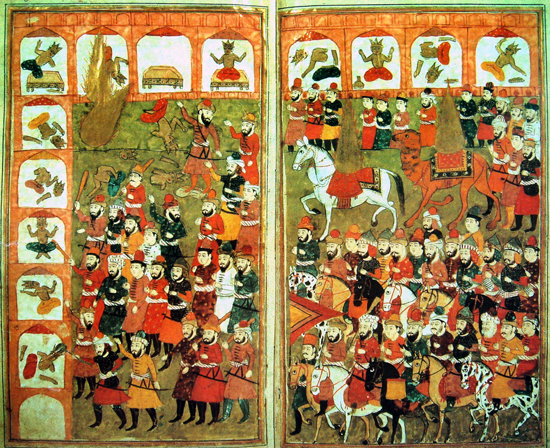 DESCRIPTION: Every ancient pantheon refers to its own loser gods. Whether we look to Babylon, Egypt, Greece, China, the Aztecs, or myriad indigenous cosmologies, we will find the stories of those lesser deities who have been disgraced, banished, or punished. Some have absurd physiologies or disfigurements; others follow paranormal rituals or possess borderline useless powers that cause them to fall outside the top levels of the universal hierarchy. Some have been forgotten, lost in time; others are feared for they bring plague, famine, disease; still others play no role in the world's destiny or dwell in the shadows, the vapor, or the nothing itself. Prometheus, Medusa, Arachne, Set, Ahriman, Nezha, Sedna, Loki, Hades, Pandora, Kali, Tiamat, Xolotl, Aipaloovik, Erlik, Satan, and thousands more.
DESCRIPTION: Every ancient pantheon refers to its own loser gods. Whether we look to Babylon, Egypt, Greece, China, the Aztecs, or myriad indigenous cosmologies, we will find the stories of those lesser deities who have been disgraced, banished, or punished. Some have absurd physiologies or disfigurements; others follow paranormal rituals or possess borderline useless powers that cause them to fall outside the top levels of the universal hierarchy. Some have been forgotten, lost in time; others are feared for they bring plague, famine, disease; still others play no role in the world's destiny or dwell in the shadows, the vapor, or the nothing itself. Prometheus, Medusa, Arachne, Set, Ahriman, Nezha, Sedna, Loki, Hades, Pandora, Kali, Tiamat, Xolotl, Aipaloovik, Erlik, Satan, and thousands more.
This Seminar will track these loser gods and resurrect their narratives as a new philosophical-mystical outlook. Through them, we will wonder about alternative existences where those once most neglected might rule.
Session 1: Dethroned Gods (Overthrow) and Gods of Failed Revolutions (Rebellion)
Session 2: Outcast Gods (Exile) and Minor Gods (Irrelevance)
Session 3: Gods of Lost Powers (Disenchantment) and Gods of Lost Status (Obsolescence)
Session 4: Trickster Gods (Play) and Accursed Gods (Pain)
IMAGE: Bazil, Haydari Battle, 1808
To see The New Centre Refund Policy CLICK HERE.
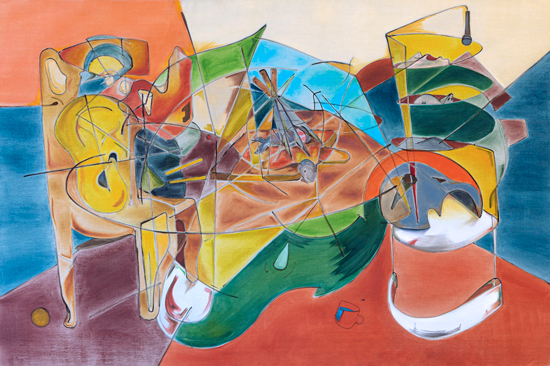 DESCRIPTION: This four-session Seminar undertakes an analysis of ‘the structure of world history’—to adopt Kojin Karatani’s term for organizing phenomena and processes which span across historical, economic, religious, political and mass psychological horizons. The analysis will be conducted in the vein of a synthesis between horizontalists and verticalists, where the difference between the two is often understood in terms of the emphasis put on the contrast between networks and bottom-up processes on the one hand and hierarchical models equipped with a central command and control on the other.
DESCRIPTION: This four-session Seminar undertakes an analysis of ‘the structure of world history’—to adopt Kojin Karatani’s term for organizing phenomena and processes which span across historical, economic, religious, political and mass psychological horizons. The analysis will be conducted in the vein of a synthesis between horizontalists and verticalists, where the difference between the two is often understood in terms of the emphasis put on the contrast between networks and bottom-up processes on the one hand and hierarchical models equipped with a central command and control on the other.
By reconceptualizing organizational structures as operating in a space that combines aspects of hierarchical (vertical) and networked (horizontal) models, this Seminar will examine contemporary frameworks in political, economic, and social systems’ increasing failure to address the challenges posed by complex systems that do not fit neatly into either horizontalist or verticalist paradigms. The structures shaping history reflect interactions that cut across these traditionally understood categories. This is the model of depth—understood computationally as a blend of these dimensions across scales of an organization—which is precisely what we must strive to comprehend in order to address the shortcomings of how we describe the structure of world history. Given that our interventive practices aimed at the structure of world history are beholden to how we describe and explain it first, then a notion of “diagonal depth” is necessary for describing phenomena which, despite their appearances, are neither truly horizontal nor vertical.
To this end, this Seminar integrates insights from political science, economics, complexity theory, and computer science to propose a conceptual framework adequate for analyzing historical evolutions and organizations and systems manifesting them. A number of concepts and frameworks adequate to the task of describing such systems will be introduced, including Charles Bennett’s “Logical Depth,” Paul Vitanyi and Ming Li’s work on Kolmogorov complexity and its applications, Andrée Ehresmann’s memory evolutive systems, Aurora Apolito on the problem of scale in anarcho-communism, and Remo Badii. Antonio Politi’s work on hierarchical and scaling problems in complexity sciences will be adapted to highlight the labor involved in interpreting and transforming them.
Ultimately, this Seminar underscores the necessity of an appropriate description of a complex model of depth—one that acknowledges its hybrid nature—as a prerequisite for any meaningful engagement or transformation. Without this understanding, attempts to address or intervene in such systems—the structure of world history writ large—risk being superficial and ineffective, if not exemplifications of malicious practical vagaries of which the contemporary political spectrum is replete.
IMAGE: Rasoul Ashtary, Interview, 2022
To see The New Centre Refund Policy CLICK HERE.
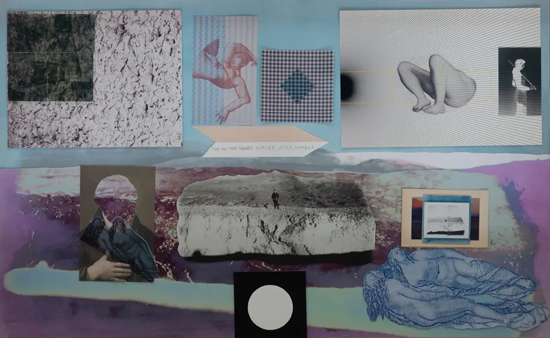 DESCRIPTION: This Seminar reexamines the philosophical underpinnings and the historical contexts that shape our understanding of “history” itself. By critically engaging with diverse schools of thought—from classical historiography to contemporary philosophies of temporality—we will re-conceptualize historical development to consider a new structural model of history as an entwining helix composed of three interdependent yet distinct strands: Nature, encompassing physical environments, climate patterns, geological transformations, and the broader ecological context within which human activity occurs, as well as the broad sweep of natural history, starting with the Big Bang and beyond, and influencing the conditions for both technologies and societies to develop; Technology, encompassing the tools and methods originating within nature but emerging as autonomous forces through which the inanimate world evolves by way of correctional processes of life contingently self-revising and innovating for survival, gradually shaping more complex forms beyond the interactions of both nature and society; Society, encompassing social and cultural norms, institutions, and identities, the history of which chronicles the organization of human communities, driven by the conditions of nature and reaching for technological advancements, and representing the sum of collective human experience—the cultural, political, and economic realms.
DESCRIPTION: This Seminar reexamines the philosophical underpinnings and the historical contexts that shape our understanding of “history” itself. By critically engaging with diverse schools of thought—from classical historiography to contemporary philosophies of temporality—we will re-conceptualize historical development to consider a new structural model of history as an entwining helix composed of three interdependent yet distinct strands: Nature, encompassing physical environments, climate patterns, geological transformations, and the broader ecological context within which human activity occurs, as well as the broad sweep of natural history, starting with the Big Bang and beyond, and influencing the conditions for both technologies and societies to develop; Technology, encompassing the tools and methods originating within nature but emerging as autonomous forces through which the inanimate world evolves by way of correctional processes of life contingently self-revising and innovating for survival, gradually shaping more complex forms beyond the interactions of both nature and society; Society, encompassing social and cultural norms, institutions, and identities, the history of which chronicles the organization of human communities, driven by the conditions of nature and reaching for technological advancements, and representing the sum of collective human experience—the cultural, political, and economic realms.
The main hypothesis of the Seminar is that these strands are co-responsive, forming the structures that define different historical epochs. Although open-ended and autonomous, they twist and turn around each other in an intricate interplay. At times, one strand may exert a dominant force, pulling the other two in its direction. For example: technological revolutions often reshape societal structures and redefine humanity's relationship with nature. Conversely, environmental shifts can compel societies to adapt, influencing technological developments. After understanding both the philosophy of history and its materialization into historical writing or historiography, this Seminar will look at the interplay of Nature, Technology and Society to analyze the theoretical and practical relevance of their intertwinement to our current predicament. We will examine whether History can be reconfigured as an open-ended process shaped by the dynamic interactions between these three factors.
Session 1: Introduction: Historiography and philosophy of history, from Herodotus and Abu Rayhan Biruni to von Ranke and Hegel. Determining the scale and scope of participants’ projects.
Session 2: The Cybernetic Concept of History: From the humanism of Walter Benjamin to the inhumanism of Land and Negarestani.
Session 3: A Triple-Helix Philosophy of History.
Session 4: Seminar Review and Participants Presentations.
.
IMAGE: R.H. Quaytman, Instaltion View, Glenstone Museum, 2022
To see The New Centre Refund Policy CLICK HERE.
HELP CREATE A PARALLEL ACADEMIA
Login / Public Programs / About / People / Membership / Programs / Seminars / Archive / Connect / Refund Policy / Apply Now / e-flux Education
For currently running and past Seminars please visit the Archive.
Critical Collapsology Part 2:
Limitless Risk
Instructor: Richard HamesProgram: History, Design & WorldmakingCredit(s): 1Date: August 17, 24, 31, September 7Time: 09:00-11:30 ET
 DESCRIPTION: Last season, in the first part of this Seminar, we established a new frame for studying the rapid decomposition of social structure, called 'critical collapsology.' This theory more adequately conceptualizes the vulnerabilities faced by global capitalist societies and sketches an orientation toward collapse.
DESCRIPTION: Last season, in the first part of this Seminar, we established a new frame for studying the rapid decomposition of social structure, called 'critical collapsology.' This theory more adequately conceptualizes the vulnerabilities faced by global capitalist societies and sketches an orientation toward collapse.However, the theory remains relatively abstract. In this second part of the Seminar, we will look at the particular histories that have led us to our vulnerable present moment and develop a radical politics adequate to our incapacity for formulating utopias. How did the world become so vulnerable? How have people responded to vulnerability before? Why is the end of utopia a problem for the left? What institutions should we create now, and how?
Session 1: We will run a collective mapping project to enumerate our current risks. We will introduce the horizon scanning techniques, the Delphi method, and the basic principles and theory of prediction markets.
Session 2: Starting from the premise that collapse is already an object in contemporary politics, we will survey responses to its prospect. Each response imagines a particular mode of collapse and proposes ways to address it. These responses range from drastic to gentle, gestural to programmatic.
Session 3: We turn to the reformulation of a 'communist core' in politics and its status, given the risk of collapse. The communist task requires actualization in a world simultaneously made possible and frustrated by capitalism. Marx and Engels describe communism as ""the real movement which abolishes the present state of things. The conditions of this movement result from the premises now in existence."" What if those premises are no longer in existence?
Session 4: Exploring practical questions, we ask what political possibilities persist through any future collapse, materially and conceptually. What strategies for resilience, emergency responses, and transformations of thought into transportable protocols might be required during different stages of collapse? What should we build now?
"
IMAGE: Gabriel Alcala, Foucault In California, 2023
To see The New Centre Refund Policy CLICK HERE.
Avant-Garde Today:
The Question of Autonomy
Instructor: J.P. CaronProgram: Art & Curatorial PracticeCredit(s): 1Date: May 4th, 11th, 18th, 25th.Time: 14:00-16:30 ET
Bürger understands the avant-gardist impulse not as a new style within the institution of art but as an attempt to break with art altogether, scattering aesthetic effects upon life at large. He offers one of the clearest understandings of the avant-garde, based on art reaching out of its own definition—progressively absorbing that which is not art into that which is art. While the historical avant-garde is seen by Bürger as a final breaking point, given that art is individualized as an autonomous sphere, this same notion is taken by Lehmann to offer a model of aesthetic modernity predicated on the autonomization of the elements that compose art. Instead of reading the avant-garde as an impulse to the outside, Lehmann sees it as a new coupling between the work, the medium, and reflection itself.
Complementing these two models of the avant-garde, this Seminar will also tackle the theoretical basis the two authors are polemicizing against: Adorno's “Aesthetic Theory,” a model that Bürger takes to be intrinsically anti-avant-gardist and Lehmann tries to supersede with his understanding. Finally, in the last session we will see a more recent synthetic approach by Mattin on his book “Social Dissonance” (2023). Mattin offers a contemporary model for art reaching out of its limits—towards politics—but coinciding with a change in the materials of artmaking. Now, instead of aesthetic appearance, as Adorno would have it, the social world appears to constraint art.
Session 1: We will delve into the general themes of the Seminar, through a reading of selected sections of Bürger’s text and further secondary literature.
Session 2: We will read sections of Adorno’s “Aesthetic Theory” alongside Bürger’s “Adorno’s Anti-Avantgardism” essay. A further comparison will be drawn between Adorno and Benjamin’s “The Work of Art in the Age of Mechanical Reproduction.”
Session 3: Close reading of Harry Lehmann’s essay “Avant-garde Today,” where the model of the avant-gardist integration of the outside is discussed and tentatively replaced by the model of systemic gains in degrees of freedom.
Session 4: Discussing Mattin's very recent “Social Dissonance” (2023) as the latest incarnation of the reaching-out model, but with the twist that, for Mattin, the material of the work of art becomes the social action of its audience.
IMAGE: Oscar Niemeyer, Niteroi Contemporary Art Museum, 1996
To see The New Centre Refund Policy CLICK HERE.
Logical Time and the Production of the Intelligible
Instructor: Matt HareProgram: Critical Philosophy, History, Design & WorldmakingCredit(s): 2Date: May 17th, 24th, 31st, June 7th, 14th, 21th, 28th, July 5th.Time: 09:00-11:30 ET
 DESCRIPTION: In Jean Cavaillès’s On Logic and the Theory of Science (1942–1943; published posthumously in 1947, hereafter LTS), two central theses emerge:
DESCRIPTION: In Jean Cavaillès’s On Logic and the Theory of Science (1942–1943; published posthumously in 1947, hereafter LTS), two central theses emerge:- Science operates outside of time as understood through the lived experience of consciousness (LTS 22).
- Non-simultaneity is not historical but an intrinsic feature of the intelligible (LTS 35–36).
These ideas form the foundation of a theory of “logical time,” where mathematics is characterized by its unique historicity—its relationship between earlier and later theories—termed by Cavaillès, based on Descartes’ treatises, as mathematical concatenation. This Seminar explores how this theory, focusing on mathematical history and its philosophical stakes, illuminates the broader tradition of 20th-century French “mathematical philosophy.” Rarely studied in English, this tradition—represented by figures like Léon Brunschvicg, Albert Lautman, and others—emphasizes the history of mathematical production and its shared conceptual terrain with philosophy. Using LTS as a guide and drawing from other sources, the Seminar will construct this broader intellectual history in two parts.
Part I examines Cavaillès’s place within a tradition grappling with the production of the intelligible, rooted in Brunschvicg, Cartesian rationalism, and the paradox of producing time within time itself. Cavaillès reframes this classical problem by asserting that “the intelligible” is defined by internal non-simultaneity and a rejection of total simultaneity in knowledge. His methodological insight—that self-evidence has been replaced by provability—reinterprets intuition as a product of concatenation, or by what Richard Dedekind called a ‘chain of operations,’ aligning with 19th-century mathematical transformations.
Part II Will Consider how these transformations set the stage for a peculiar research programme in the historiography of mathematics. We will take Cavaillès to have (implicitly) advanced a speculative interpretation in which conjunctural results from the mathematical logic of the 1920s and the 1930s concerning the so-called ‘limitations of formalisms’ (Gödel, Skolem, Church-Turing) were taken to be positive discoveries concerning the nature of the intelligible, i.e. its intrinsic ‘movement’ and resistance in principle to combinatorial enumeration. What is at stake here is nothing less than a metaphysics of mathematical production, derived—it is claimed—from an epistemological research programme for reading the actual history of mathematics. In other words, the core methodological desiderata in this tradition of treating each mathematical work as ‘a regional and specific product’ (Desanti 1983), for all that it is often presented as a strictly methodological or epistemological norm, in fact has roots in an underlying metaphysical distinction between production and what is produced (or, in Cavaillès’s language, between the effectuating and the effectuated). As Cavaillès understood it, this meant that contemporary mathematical logic had shown the ruin of any philosophy of transcendental constitution, and thus of post-Kantian approaches to the philosophy of science, including phenomenology.
Against such philosophies of the transcendental subject, Cavaillès (paradoxically) proposed a theory of the act without a subject. We shall close by considering the origins and future of this doctrine in the philosophy of mathematics, broadly conceived.
SEMINAR OUTLINE
Session 1. Introduction to the ‘Production’ of Mathematical Theories and the Transtheoretical Character of Mathematical Objects, Two Perspectives
Session 2. A ‘Cartesian’ Opposition in the Theory of Proof
Session 3. Logical Time as a Problem in the French Philosophical Field
Session 4. The Necessary Generation of New Concepts, or 19th Century Mathematics Through a Cartesian Lens
Session 5. Rationalist Nominalism as a Research Programme in the Historiography of Mathematics
Session 6. The Method of Recursion and the Horizon of Effective Computability
Session 7. The Act Without a Subject
Session 8. Old and New Problems
IMAGE: George Nees, Untitled, 1965
To see The New Centre Refund Policy CLICK HERE.
Art Writing Against the Grain:
Towards a New Criticism
Instructor: Sean TatolProgram: Art & Curatorial PracticeCredit(s): 1Date: May 17th, 24th, 31st, June 7th.Time: 14:00-16:30 ET
 DESCRIPTION: Art criticism has become a hot topic recently, after a long period of repressed dormancy in the art world. Even the forces that formerly sought to smother criticality out of existence now give lip service to the need for criticism. However, this has not coincided with an improved understanding of criticism's means or ends, which sets the stage for an impotent “critical turn.” This Seminar will seek to remedy that blindness by studying the history of contemporary art's move away from criticism alongside examples of criticism's successes and failures.
DESCRIPTION: Art criticism has become a hot topic recently, after a long period of repressed dormancy in the art world. Even the forces that formerly sought to smother criticality out of existence now give lip service to the need for criticism. However, this has not coincided with an improved understanding of criticism's means or ends, which sets the stage for an impotent “critical turn.” This Seminar will seek to remedy that blindness by studying the history of contemporary art's move away from criticism alongside examples of criticism's successes and failures.Neither the Left's self-satisfied identity politics nor the Right's reactionary provocations present a way back to art as something more than political signification, and we must recover precisely the terms of art's irreducibility if a new criticism is to emerge. To do so, we must understand how those terms changed in the later parts of the twentieth century, how they degenerated into inarticulate relativism, how that relativity expresses itself (even in those who seek to resist it), and how it can be possible to apply new terms of valuation in a hostile climate.
Session 1. The rhetoric of contemporary art: Beginning approximately with the battles around Michael Fried's "Art and Objecthood," come to terms with the expansions of art discourse from the '60s to the trap of 2010s contemporary art as diagnosed by Suhail Malik in "On The Necessity of Art's Exit from Contemporary Art."
Session 2. The indecision of contemporary art criticism: We will look at examples of art writing's inability to engage with contemporary art or set up concepts for adequate discussion while diagnosing the nature of its impasse.
Session 3. The possibility of a new art criticism: We will consider how criticism can reconcile grounded historicity with the awareness of its own relativity, updating judgment without falling into a stale conservatism.
Session 4: Presentation of final projects
IMAGE: Arshile Gorky, Untitled, 1944
To see The New Centre Refund Policy CLICK HERE.
Copresence Research Laboratory
Instructor: Christopher DanielProgram: History, Design & Worldmaking, Art & Curatorial PracticeCredit(s): 1Date: June 14th, 21st, 28th, July 5th.Time: 14:00-16:30 ET
 DESCRIPTION: Where are you, right now? Where are you present?
DESCRIPTION: Where are you, right now? Where are you present?Our bodies, our minds, our ideas, our data: where are they —where are we— present at any given moment? On whose territory —on land, on paper, on servers— are we living our lives and how does that serve us? This Seminar is designed to be as much about those who attend it as the content that is delivered. These gatherings are as much about the physical places from which we join the calls and the physical routes that carry our data between us as they are about the ways in which we co-create places online.
The Seminar is conceived as the establishment of a collaborative lab for collective investigation into presence and co-presence. Our focus will be on a more intentional and considerate relationship with our data, our places, our fellow humans and the other-than-human. While for most of our history, a human individual could be in one place at one time, our ability to extend and expand our presence has grown exponentially in recent centuries. By engaging with the histories and affordances of the social and technical systems that facilitate our meeting from diverse locations around the world, we will explore our relationships and agency —as designers, as worldmakers— within them.
Session 1: Presence & consciousness. We will begin where we are, both in physical and virtual space. We will investigate the relationships between our locations around the world, the locations of our data and the platforms and jurisdictions within which we are resident.
Session 2: Gathering, arrangement & copresence. With a greater consciousness of where we are all reside, we will look at how we gather. For most of human history, gathering and separation has been in physical space. What can we learn from centuries of evolution of gathering places in order to better inform the ways we design and gather in virtual places?
Session 3: Collective inquiry into future presence. Where might this take us next? What might be better than a videocall? What can we test right now? With a two week gap between sessions 2 & 3, there will have been the possibility for group or individual investigation into the topics above.
Session 4: Space for emergence. The intention for this session is that its content and format will have primarily emerged from the research and experimentation in previous sessions. We may be on a videocall; it may be an audio call as we walk outside; we may gather in a virtual world of our own devising.
IMAGE: Paul Klee, In Angels Care, 1931
To see The New Centre Refund Policy CLICK HERE.
Loser Gods and Deities
Instructor: Jason Mohaghegh Program: Transdisciplinary Studies, Art & Curatorial PracticeCredit(s): 1Date: July 12th, 19th, 26th, August 2nd.Time: 14:00-16:30 ET
 DESCRIPTION: Every ancient pantheon refers to its own loser gods. Whether we look to Babylon, Egypt, Greece, China, the Aztecs, or myriad indigenous cosmologies, we will find the stories of those lesser deities who have been disgraced, banished, or punished. Some have absurd physiologies or disfigurements; others follow paranormal rituals or possess borderline useless powers that cause them to fall outside the top levels of the universal hierarchy. Some have been forgotten, lost in time; others are feared for they bring plague, famine, disease; still others play no role in the world's destiny or dwell in the shadows, the vapor, or the nothing itself. Prometheus, Medusa, Arachne, Set, Ahriman, Nezha, Sedna, Loki, Hades, Pandora, Kali, Tiamat, Xolotl, Aipaloovik, Erlik, Satan, and thousands more.
DESCRIPTION: Every ancient pantheon refers to its own loser gods. Whether we look to Babylon, Egypt, Greece, China, the Aztecs, or myriad indigenous cosmologies, we will find the stories of those lesser deities who have been disgraced, banished, or punished. Some have absurd physiologies or disfigurements; others follow paranormal rituals or possess borderline useless powers that cause them to fall outside the top levels of the universal hierarchy. Some have been forgotten, lost in time; others are feared for they bring plague, famine, disease; still others play no role in the world's destiny or dwell in the shadows, the vapor, or the nothing itself. Prometheus, Medusa, Arachne, Set, Ahriman, Nezha, Sedna, Loki, Hades, Pandora, Kali, Tiamat, Xolotl, Aipaloovik, Erlik, Satan, and thousands more.This Seminar will track these loser gods and resurrect their narratives as a new philosophical-mystical outlook. Through them, we will wonder about alternative existences where those once most neglected might rule.
Session 1: Dethroned Gods (Overthrow) and Gods of Failed Revolutions (Rebellion)
Session 2: Outcast Gods (Exile) and Minor Gods (Irrelevance)
Session 3: Gods of Lost Powers (Disenchantment) and Gods of Lost Status (Obsolescence)
Session 4: Trickster Gods (Play) and Accursed Gods (Pain)
IMAGE: Bazil, Haydari Battle, 1808
To see The New Centre Refund Policy CLICK HERE.
The Depthwise & the Diagonal
Instructor: Reza NegarestaniProgram: Critical Philosophy, History, Design & WorldmakingCredit(s): 1Date: July 25th, August 1st, 8th, 15th.Time: 10:00-12:30 ET
 DESCRIPTION: This four-session Seminar undertakes an analysis of ‘the structure of world history’—to adopt Kojin Karatani’s term for organizing phenomena and processes which span across historical, economic, religious, political and mass psychological horizons. The analysis will be conducted in the vein of a synthesis between horizontalists and verticalists, where the difference between the two is often understood in terms of the emphasis put on the contrast between networks and bottom-up processes on the one hand and hierarchical models equipped with a central command and control on the other.
DESCRIPTION: This four-session Seminar undertakes an analysis of ‘the structure of world history’—to adopt Kojin Karatani’s term for organizing phenomena and processes which span across historical, economic, religious, political and mass psychological horizons. The analysis will be conducted in the vein of a synthesis between horizontalists and verticalists, where the difference between the two is often understood in terms of the emphasis put on the contrast between networks and bottom-up processes on the one hand and hierarchical models equipped with a central command and control on the other.By reconceptualizing organizational structures as operating in a space that combines aspects of hierarchical (vertical) and networked (horizontal) models, this Seminar will examine contemporary frameworks in political, economic, and social systems’ increasing failure to address the challenges posed by complex systems that do not fit neatly into either horizontalist or verticalist paradigms. The structures shaping history reflect interactions that cut across these traditionally understood categories. This is the model of depth—understood computationally as a blend of these dimensions across scales of an organization—which is precisely what we must strive to comprehend in order to address the shortcomings of how we describe the structure of world history. Given that our interventive practices aimed at the structure of world history are beholden to how we describe and explain it first, then a notion of “diagonal depth” is necessary for describing phenomena which, despite their appearances, are neither truly horizontal nor vertical.
To this end, this Seminar integrates insights from political science, economics, complexity theory, and computer science to propose a conceptual framework adequate for analyzing historical evolutions and organizations and systems manifesting them. A number of concepts and frameworks adequate to the task of describing such systems will be introduced, including Charles Bennett’s “Logical Depth,” Paul Vitanyi and Ming Li’s work on Kolmogorov complexity and its applications, Andrée Ehresmann’s memory evolutive systems, Aurora Apolito on the problem of scale in anarcho-communism, and Remo Badii. Antonio Politi’s work on hierarchical and scaling problems in complexity sciences will be adapted to highlight the labor involved in interpreting and transforming them.
Ultimately, this Seminar underscores the necessity of an appropriate description of a complex model of depth—one that acknowledges its hybrid nature—as a prerequisite for any meaningful engagement or transformation. Without this understanding, attempts to address or intervene in such systems—the structure of world history writ large—risk being superficial and ineffective, if not exemplifications of malicious practical vagaries of which the contemporary political spectrum is replete.
IMAGE: Rasoul Ashtary, Interview, 2022
To see The New Centre Refund Policy CLICK HERE.
The Triple-Helix Structure of World History
Instructor: Mohammad SalemyProgram: Critical Philosophy, History, Design & WorldmakingCredit(s): 1Date: June 27th, July 4th, 11th, 18thTime: 09:00-11:30 ET
 DESCRIPTION: This Seminar reexamines the philosophical underpinnings and the historical contexts that shape our understanding of “history” itself. By critically engaging with diverse schools of thought—from classical historiography to contemporary philosophies of temporality—we will re-conceptualize historical development to consider a new structural model of history as an entwining helix composed of three interdependent yet distinct strands: Nature, encompassing physical environments, climate patterns, geological transformations, and the broader ecological context within which human activity occurs, as well as the broad sweep of natural history, starting with the Big Bang and beyond, and influencing the conditions for both technologies and societies to develop; Technology, encompassing the tools and methods originating within nature but emerging as autonomous forces through which the inanimate world evolves by way of correctional processes of life contingently self-revising and innovating for survival, gradually shaping more complex forms beyond the interactions of both nature and society; Society, encompassing social and cultural norms, institutions, and identities, the history of which chronicles the organization of human communities, driven by the conditions of nature and reaching for technological advancements, and representing the sum of collective human experience—the cultural, political, and economic realms.
DESCRIPTION: This Seminar reexamines the philosophical underpinnings and the historical contexts that shape our understanding of “history” itself. By critically engaging with diverse schools of thought—from classical historiography to contemporary philosophies of temporality—we will re-conceptualize historical development to consider a new structural model of history as an entwining helix composed of three interdependent yet distinct strands: Nature, encompassing physical environments, climate patterns, geological transformations, and the broader ecological context within which human activity occurs, as well as the broad sweep of natural history, starting with the Big Bang and beyond, and influencing the conditions for both technologies and societies to develop; Technology, encompassing the tools and methods originating within nature but emerging as autonomous forces through which the inanimate world evolves by way of correctional processes of life contingently self-revising and innovating for survival, gradually shaping more complex forms beyond the interactions of both nature and society; Society, encompassing social and cultural norms, institutions, and identities, the history of which chronicles the organization of human communities, driven by the conditions of nature and reaching for technological advancements, and representing the sum of collective human experience—the cultural, political, and economic realms.The main hypothesis of the Seminar is that these strands are co-responsive, forming the structures that define different historical epochs. Although open-ended and autonomous, they twist and turn around each other in an intricate interplay. At times, one strand may exert a dominant force, pulling the other two in its direction. For example: technological revolutions often reshape societal structures and redefine humanity's relationship with nature. Conversely, environmental shifts can compel societies to adapt, influencing technological developments. After understanding both the philosophy of history and its materialization into historical writing or historiography, this Seminar will look at the interplay of Nature, Technology and Society to analyze the theoretical and practical relevance of their intertwinement to our current predicament. We will examine whether History can be reconfigured as an open-ended process shaped by the dynamic interactions between these three factors.
Session 1: Introduction: Historiography and philosophy of history, from Herodotus and Abu Rayhan Biruni to von Ranke and Hegel. Determining the scale and scope of participants’ projects.
Session 2: The Cybernetic Concept of History: From the humanism of Walter Benjamin to the inhumanism of Land and Negarestani.
Session 3: A Triple-Helix Philosophy of History.
Session 4: Seminar Review and Participants Presentations.
.
IMAGE: R.H. Quaytman, Instaltion View, Glenstone Museum, 2022
To see The New Centre Refund Policy CLICK HERE.
To see The New Centre Refund Policy CLICK HERE.